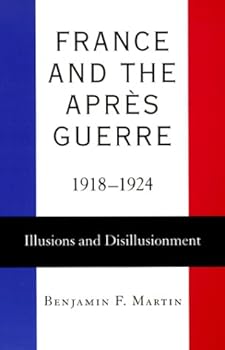France and the Apres Guerre, 1918-1924 : Illusions and Disillusionment
Select Format
Select Condition 
Book Overview
Although victorious in World War I, the French of the Third Republic soon learned the devastating price of success. The grave loss of life and incredibly harsh conditions during and after the war shook survivors to the core. The extraordinary suffering would eventually bring about the collective failure of national nerve in the 1930s that led to the appeasement at Munich and the collapse before German invasion in June 1940. But during the Apres Guerre - the half decade following World War I - the French held out hope for a return to the ideal conditions of the Belle Epoque, a hope that gradually gave way to disillusionment.
Format:Hardcover
Language:English
ISBN:0807123994
ISBN13:9780807123997
Release Date:January 1999
Publisher:Louisiana State Univ Pr
Length:278 Pages
Weight:1.01 lbs.
Dimensions:9.5" x 1.3" x 6.5"
Related Subjects
HistoryCustomer Reviews
1 rating
A cleverly-written account of Post World War I France!
Published by Thriftbooks.com User , 26 years ago
Life in France after the First World War just didn't make sense to a country that could have been content to win the war. To wit, a political cabinet change at the beginning of 1922 would be enough to fuel one young woman to take off all her clothes in freezing cold weather one afternoon and voice her mad opinions to a crowd assembled at the Place Pigalle. Other Frenchmen killed themselves and their loved ones, deciding that the postwar period was a bit too overwhelming with its high inflation, soaring crime rate, changing moral codes and addictions, among other things. Over 1.3 Frenchmen died in this war and the destruction was said to be 55 million francs. France stood alone trying to face Germany, as everything around it seemed to be going to hell. If the country were a canvas, then Dadaist mayhem was splashed across it from end to end, evoking a portrait of a country that won a war and, yet lost the peace.Benjamin F. Martin's France and the Apres Guerre 1918-1924: Illusions and Disillusionment is not so much about a country standing as tall and proud in victory as its very own Arc de Triomphe, but about one that found it could no longer embrace the creature comforts and good times it knew in the Belle Epoque. A wonderfully-written roller coaster ride through the politics and political figures of the period, the harsh postwar conditions, widespread changes and society, it uses anecdotes about how the leaders of the day -- Georges Clemenceau, Raymond Poincare, and Aristide Briand -- tried to make sense of the period in the midst of stories of everyday Frenchmen struggling to get to the next day. It is the stories of these everyday Frenchmen that make this such an engaging -- and heartbreaking -- work. For the French, all that was old was not new again or familiar. Women were hired as detectives. Feminine beauty was not about having dangerous curves. It was about vigorous exercise, because "to get fat is to look old." Basketball was the new hot sport on the block...but the French were individualistic and too short to play it. Department stores had fur sales, but few women could afford to buy them still. Martin uses F. Scott Fitzgerald's Dick Diver to explain the sense of disillusionment: "All my beautiful lovely safe world blew itself up here with a great gust of high explosive love."





